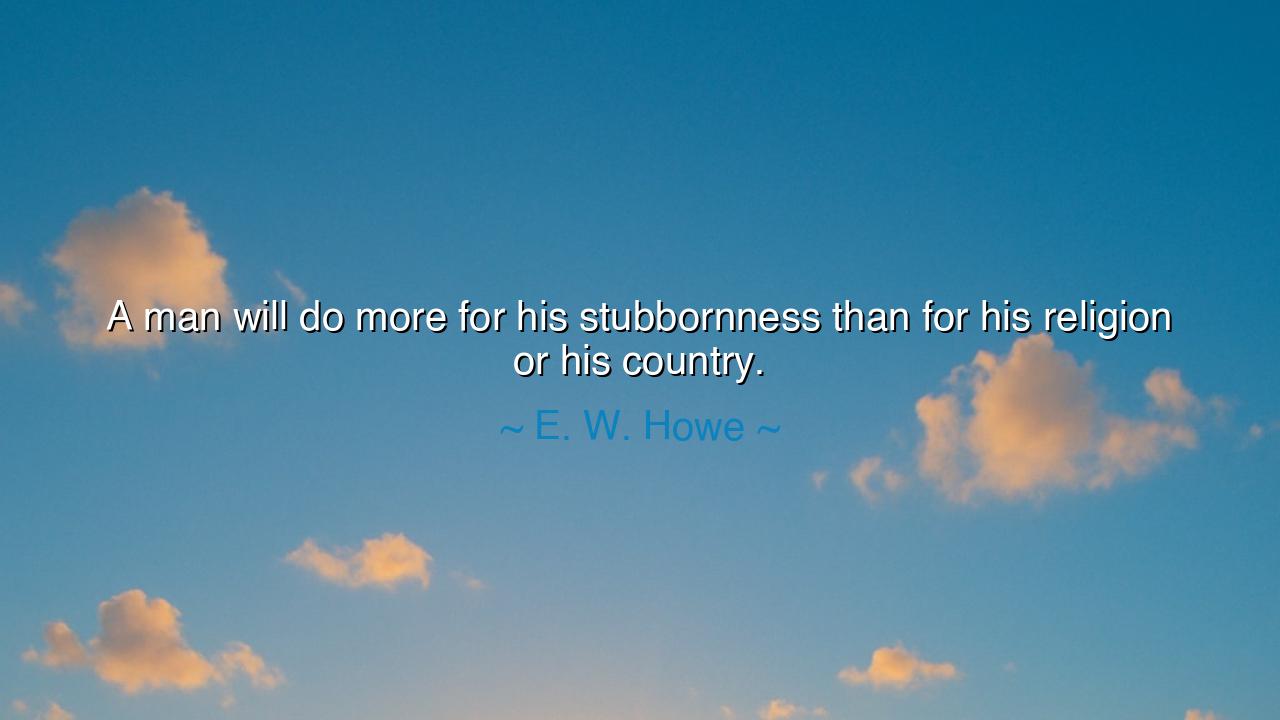
A man will do more for his stubbornness than for his religion or






“A man will do more for his stubbornness than for his religion or his country.” — thus wrote E. W. Howe, the American novelist and moral observer, whose pen was sharp with irony yet heavy with truth. In this piercing statement, Howe holds a mirror to the human heart and reveals one of its oldest, most dangerous qualities — pride. His words strike not as cynicism, but as wisdom born of long observation: that man’s devotion to his stubbornness often surpasses even his loyalty to faith or homeland. What is religion without humility? What is patriotism without reason? Yet stubbornness — that fiery offspring of ego — burns through them all, driving men to cling to their own opinions, even when truth, morality, and love plead with them to let go.
The origin of this quote can be traced to Howe’s reflections on the folly of human nature, written in the late 19th century, a time when the world was filled with upheaval — wars of nationalism, conflicts of ideology, and the growing tension between science and religion. Howe, a thinker of the common man, observed that the root of many such conflicts lay not in principle, but in personal pride. Men, he saw, were willing to die for their stubbornness — to defend their own ideas simply because they were their own. What began as conviction would harden into obstinacy; what began as belief would decay into blindness. Thus, Howe’s observation is not merely about stubbornness as a flaw, but as a force — a force that can either forge greatness or destroy it, depending on how it is governed.
To understand this truth, we must look to history. Consider the tragedy of King Lear, that ancient monarch of Shakespeare’s imagination. In his pride, Lear demanded that his daughters prove their love with words rather than deeds. When his truest daughter, Cordelia, refused to flatter him, he banished her in anger. His stubbornness, his inability to admit error, led not only to his own ruin but to the destruction of his kingdom and family. Only when madness and loss stripped him bare did Lear see his folly — that pride had made him blind, that stubbornness had enslaved him. And so, Howe’s words echo across the centuries: man will go further for his stubbornness than for any cause he claims to serve.
But stubbornness is not always evil; it is, like fire, a thing of dual nature. It can warm or consume. The same quality that drives a fool to destruction can also drive a visionary to greatness. The Wright brothers, mocked by their peers, persisted in their dream of flight when others called it madness. Their stubbornness was sanctified by purpose — not pride. They refused to yield, not to protect their ego, but to prove that humanity could ascend beyond the earth. This, then, is the distinction Howe would have us see: stubbornness born of pride destroys; stubbornness born of conviction uplifts.
The peril lies in the moment when conviction turns inward — when the stubbornness that once served an ideal begins to serve only the self. Religion and patriotism, in their truest forms, ask man to look beyond himself, to something higher. But stubbornness, unchecked, narrows his vision until he can see nothing but his own reflection. Nations fall to this blindness; wars are waged not for justice but for wounded pride. Even faith itself, when corrupted by stubborn dogma, becomes a weapon rather than a light. Howe’s warning is thus timeless: beware the moment when belief becomes obstinacy, and devotion becomes defiance.
We see this truth in the world around us still. People will argue endlessly not to discover truth, but to win — not to learn, but to avoid admitting that they were wrong. Families divide, friendships crumble, nations fracture — all because pride whispers that surrender is weakness. Yet the ancients knew better: the wise man yields not out of fear, but out of understanding. The oak that resists every wind will break; the reed that bends will survive the storm. The truly strong are not those who never yield, but those who know when to yield and when to stand firm.
Therefore, my friends, let us heed Howe’s wisdom. Guard your stubbornness as you would guard fire — let it burn for truth, not for vanity. Be steadfast in your principles, but humble in your heart. When others challenge you, listen not only with your ears but with your spirit. Ask yourself: “Am I defending what is right — or merely defending myself?” Learn to distinguish between courage and pride, between conviction and arrogance. The path of the wise is not to extinguish stubbornness, but to master it — to let it serve the truth, not the ego.
For in the end, religion and country are noble only when guided by humility, and a man’s greatness lies not in how fiercely he clings to his own ideas, but in how bravely he can let them go when truth reveals a higher way. Remember this, as Howe did: that stubbornness, unchecked, can make gods of fools — but humility, embraced, can make saints of men.






AAdministratorAdministrator
Welcome, honored guests. Please leave a comment, we will respond soon